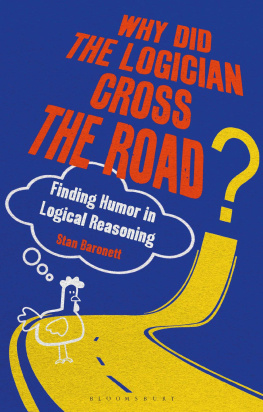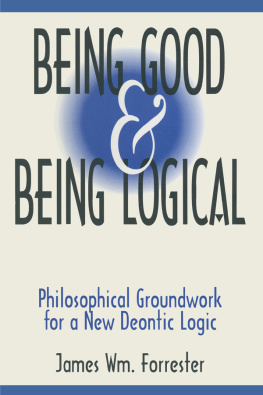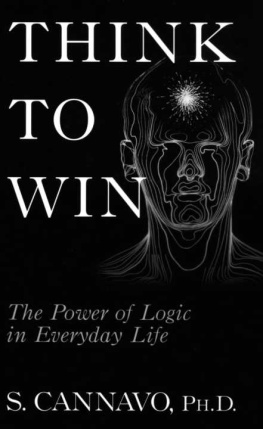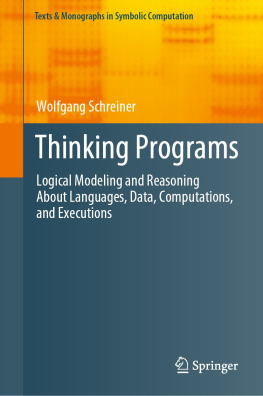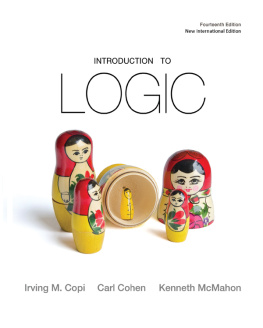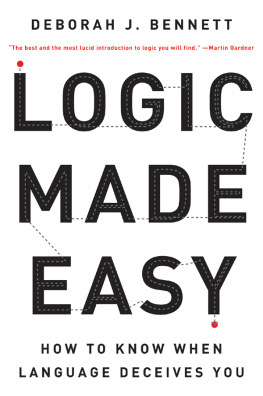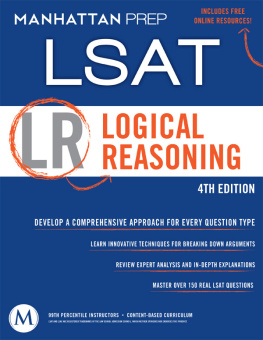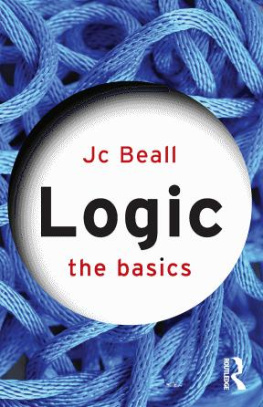
Why Did the Logician
Cross the Road?
Also Available From Bloomsbury
Critical Thinking, Robert Arp and Jamie Carlin Watson
Everyday Examples, David Cunning
How to Win Every Argument, Madsen Pirie
Knowledge and Reality in Nine Questions, Matthew Davidson
Using Questions to Think, Nathan Eric Dickman

Contents
The goal of introducing philosophical thought through humor is not new. Several books have used humor to illustrate such topics as ethics, metaphysics, epistemology, religion, and politics. Those books presented great thinkers such as Plato, Aristotle, and Kant, while also offering insights into classic philosophical traditions such as rationalism, empiricism, and existentialism.
In this book, humor is used to introduce basic logical reasoning and its connection to real life. The important, interesting, and practical applications of logical reasoning are presented using jokes and stories. Humor can help us understand logic, and logic can help us understand humor.
While logical reasoning is typically presented and studied as an abstract subjectquite often through the use of a formal, symbolic languageit can in fact be shown to have a grounded and practical application. By combining jokes, stories, and ironic situations, logical reasoning is woven into the fabric of everyday experience. Humor can defuse the anxiety many people associate with abstract logical concepts. And since most people are good at remembering jokes and funny stories, they can readily grasp and recall the logical points that are illustrated.
So, in the best of all possible worlds, reading this book will help you understand some of the fundamentals of logical reasoning, and give you a few laughs. In the worst of all possible worlds, it will do neither. If the latter turns out to be the case, then blame Gottfried Leibnizhes the one who said that this was the best of all possible worlds.
On the other hand, readers might experience a phenomenon similar to what Groucho Marx once wrote about regarding his friends recently published book: From the moment I picked up your book until I put it down, I was convulsed with laughter. Some day I intend reading it.
Logical reasoning and humor have an interesting relationship. Jokes often set up a plausible premise based on everyday experience. Once the basics of the story are set, our minds anticipate typicaland logicalendings based on patterns of experience gained throughout our lives. An effective joke may rely on an unanticipated assumption that leads to an unexpected result. The assumption changes the normal context of an everyday situation, so we are surprised by the ending. After all, we rely on our minds to predict the future, based on past experience. A complex mind that learns from experience, and builds a storehouse of regularly recurring patterns, is a great survival tool. But for a joke to be effective, the punch line has to be something our minds dont logically anticipate. The ending jolts our minds for a split second while we grasp the absurdity of the situation. Laughter is a release of the tension caused by an unexpected outcome. Laughter massages the logical mind.
In our daily routines, a sudden collapse of powers of prediction would be scary. But when we listen to a joke we are willing to suspend those powers. The unexpected punch line is not threatening because we know it is not a real-life situation and nothing is at stake. The joke lets us experience unpredictability safely, and reminds us that our powers of prediction are subject to the endless uncertainties of life, as the following story illustrates:
A philosophy teacher decides to try something different to test his students. Today we are going to have a pop quiz. The students groan and grumble as they take out some paper to write.
The teacher lifts a chair, puts it on his desk and says, I want you to apply what you have learned in this class and prove to me that the chair I placed on the desk does not exist.
While the rest of the class gets immediately busy writing elaborate essays using dubious philosophical ideas, one student remains surprisingly calm. The confident student hands in her paper, on which is written: What chair?
Diverse life experiences help us anticipate future events and recognize the logic of a situation. For purposes of understanding how logic works we can look at how our minds function on several levels. The first level concerns facts and the determination of truth. This function can be understood through a simple exercise. Read the following short sentence, and as soon as you finish try not to decide whether the sentence is true or false:
The Statue of Liberty is made of green cheese.
Okay, admit it. As soon as you read the sentence you knew it to be false. You did not have to think about it, and you could not stop the process because one part of your mind immediately determined that it was false. So, in a sense, your conscious self had no say in the matter, your knowing that it was false was a mind-jerk reaction. As this illustrates, one part of your mind is constantly working on determining whether the information you are receiving from the world is true or false.
But another part of your mind works differently. It deals with the logical consequences of information; in other words, what follows from that information. This part of the mind does not try to determine whether the information is true or false. Instead, it investigates whether one piece of information follows from other pieces. For example, suppose you are driving a car and you are about to enter an intersection where the light is green. Although you cannot see the cross-traffic light, you infer or conclude that it is red. But your conclusion could be wrongthe cross-traffic light could be malfunctioning. Given this, we say that your inference has an uncertainty to it.
When we receive information, we often begin anticipating where that information might lead. Depending on the situation, it is also natural to interpret the information as stemming from the context in which it occurs. For example, the following conversation might arise when a student goes to her instructors office:
I have been thinking a lot about the consequences of our actions, and how the different moral theories you have introduced to us in our Ethics class are to be understood and applied to everyday situations. For example, I would like to know if it is always wrong to punish a person for something she didnt do?
The instructor says, Yes, that would be wrong.
The student says, Thats good to hear because I didnt do my homework.
The instructor interprets the students question as indicating the student is taking the course seriously and is trying to work out how moral theories can be applied to an apparent hypothetical situation. Therefore, the instructors answer is based on that interpretation. As we saw earlier, our minds work on several levels, and our conscious thoughts are only the tip of the iceberg compared to the vast amount of unconscious processing that goes on constantly in our brains.
When we watch a movie or read a novel, we often try to anticipate the ending. For example, as a murder mystery unfolds we might try to guess who did it, and we can make adjustments as more information and clues are revealed. This shows that we are actively assessing the significance of information, interpreting it, and judging which outcome is more likely to follow from the evidence currently at hand. Depending on the complexity of the story, we might change our minds several times until the answer is finally revealed. And we can be completely fooled by a surprise ending. This active process of deriving possible conclusions as a story unfolds also happens when we hear a comedian tell a joke, or when we read a funny story.
Next page
